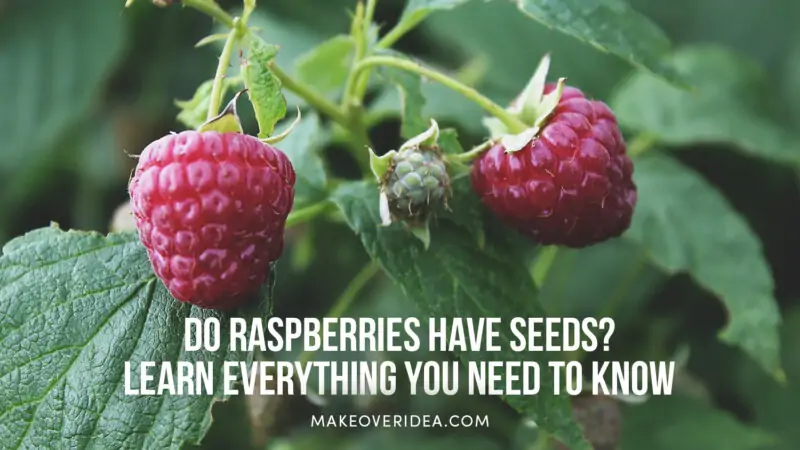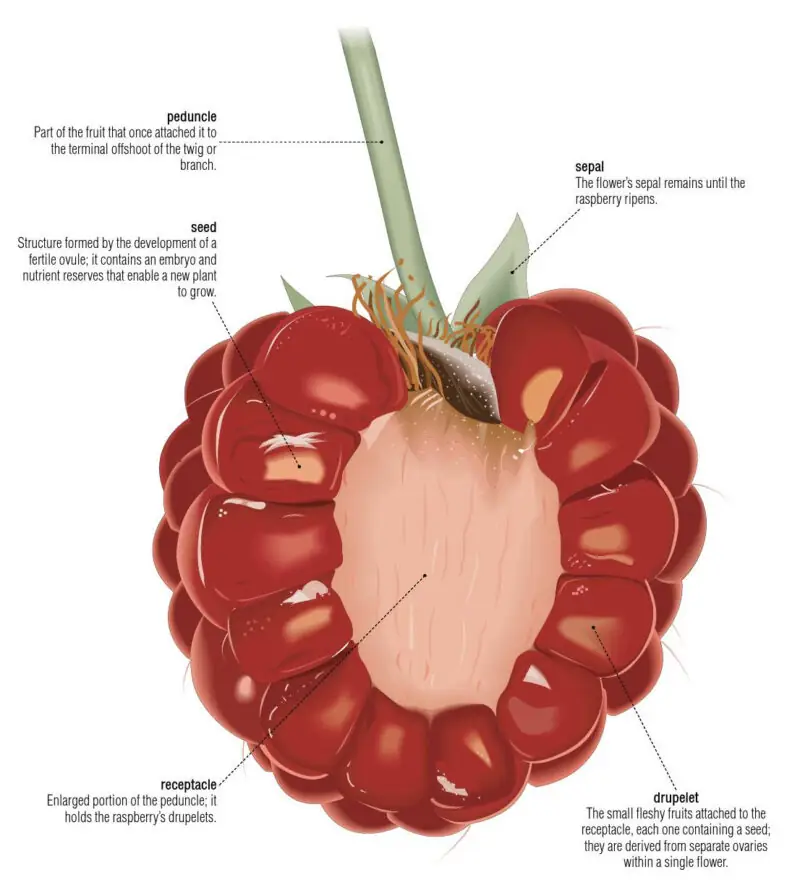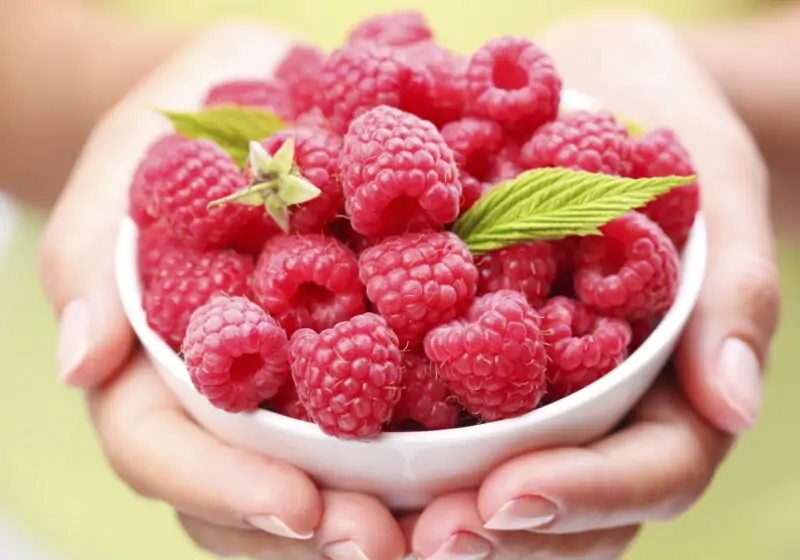Do Raspberries Have Seeds? All About Red Raspberry

Have you ever wondered do raspberries have seeds? The answer is yes! Raspberries do indeed have seeds, and in this article, we’ll be exploring everything there is to know about these tiny little things. From their unique structure to how to grow raspberry plants from seed, we’ve got everything you need to know.
Raspberry Seeds: The Basics
What Are Raspberry Seeds?
Raspberry seeds are small, brownish-black bead-like structures that are found inside the individual drupelets that make up a raspberry fruit. Each small drupelet contains a seed. So, the quick answer our question is yes, raspberry contains tiny seeds: there are, in fact, 100 to 120 seeds per single berry.
The Unique Structure of Raspberries

What sets these juicy red fruits apart from other fruits is their aggregate structure. Unlike many other fruits which contain just one or a few large seeds situated at the center of the fruit’s flesh (such as cherries or peaches), raspberry seeds aren’t concentrated at the center. On the contrary, these berries are made up of many smaller drupelets and each of them contains one seed: together they form an aggregate fruit.
This means that every time someone enjoys fresh raspberries or any product made using them (raspberry jams, sauces, desserts, jellies, etc.), they’re actually consuming tens – sometimes hundreds – of tiny black raspberry seeds!
Growing Raspberry Plants from Seeds
Raspberries can be grown from seeds, but it requires patience and the right conditions for germination and growth.
How To Extract Seeds from Raspberries
Let’s find out how to grow your own raspberry. It’s entirely possible by planting a few ripe berries’ worth of raspberry seeds. Here’s how you get the seeds from fresh raspberries:
- Choose fully-ripe summer-bearing berries.
- Puree the desired amount of raspberries with a spoon in your favorite bowl until pulp forms.
- Place your mashed raspberries into the sieve placed on top of another clean bowl; sieve out solids and ensure only liquid remains. You can also use a fine-mesh strainer to remove the solids.
- Fill a container with water, then swirl around gently for a minute before tipping off most of the water.
- Repeat the process three times, ensuring no excess pulp remains before removing the seeds.
- Dry the seeds in a cool and dry place away from sunlight.
If you want to grow blackberries, the succulent tart blue fruits, the same procedure also applies to them.
Germination and Planting Raspberry Seeds
Once you’ve extracted the seeds, it’s time to germinate them. To do this, you’ll need some compost and a tray or pot with drainage holes. Here are the steps:
- Mix equal parts of soil-based compost and Perlite.
- Fill the tray or potting container with the mixture evenly.
- Wet the surface completely.
- Scatter a limited amount of glass over the wet surface for good air circulation.
- Lightly scatter seeds on top, making sure that they are spaced out occasionally before adding a light layer of vermiculite sufficient to cover them adequately but not too heavily.
Best Practices
Raspberry plants grow best in well-drained soils and exposed to around six hours of sunlight every day for maximum fruit production. Rely on hand pollination during the blooming season and you’ll be able to harvest a lot of these juicy berries. Make sure to keep young raspberry canes moist at intervals, but don’t overwater them, as excess water could encourage the development of diseases which might affect their growth eventually. On average, these plants need 6 hours of sunlight per day.
Seedless Raspberries: Fact or Myth?
Are There Seedless Raspberry Varieties?
Though there are many “seedless” varieties advertised these days, actual genuine raspberry cultivars that produce fruits entirely devoid of seeds do not exist. Rather, such claims simply mean that the variety contains fewer seeds than typically seen, which can be challenging to remove when they occur in a large number of drupelets.
Although it does take some effort to remove the plant material from the berries and collect the seeds, the result will be definitely worth your while, as raspberries play an important role in keeping our bodies healthy! Still, if you want to save time, you can order raspberry seeds online.
According to Helen Izumo, head registered dietician of the Nutrition Department at Cedar Sinai Medical Center, “Raspberries, along with blueberries and grapefruit, contain billions of antioxidant compounds called anthocyanins, which are capable of helping to prevent diseases and slowing oxidative damage to the body.”
Removing Raspberry Seeds from Smoothies
Love raspberry flavor but don’t want to let those pesky seeds ruin your morning smoothie? There are a couple of tricks you can use to remove them. Here’s how:
- Run it through a mesh colander or fine-mesh strainer.
- Mash the raspberries before serving, and strain using the back of a spoon (if possible, use a flat one).

Raspberry Seed FAQs
The answer is yes! In fact, not only do they add texture and flavor to any dish, but they are also very high in fiber in addition to being a good source of antioxidants and essential nutrients.
According to a study published in the journal “Food Chemistry,” researchers analyzed dried black raspberry seeds and tested them alongside commercial antibiotics. They found that extracts from these incredible seeds significantly impaired the growth of Staphylococcus aureus bacteria in lab trials, proving their effectiveness in fighting food-borne illnesses!
Raspberries have an average of around 100-120 drupelets and thus approximately the same number of little seeds too – give or take a few, depending on the actual size and fertility of the variety used.
Yes, each individual drupelet contains one small seed on its outside surface.
While it is safe to eat them, we strongly advise against swallowing them whole because this could cause accidental choking, especially for children.
You can try gargling with warm water, eating soft bread or fruit, and then gently brushing over areas where seeds may be stuck during mealtime.
Conclusion
Now you know the answer to the question do raspberries have seeds. While these tiny things may seem annoying at times, remember that enjoying your berry treats helps keep your health in check. Whether you’re growing raspberries from seed or enjoying them fresh, don’t let the seeds deter you – after all, they add a healthy crunch as well!